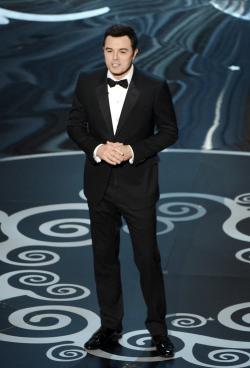No sooner did a pre-recorded Seth McFarlane, in his opening act at the 2013 Academy Awards, begin to enumerate all the actresses who’d shown their boobs onscreen than the sexism murmur started. It swelled later, as the host joked about George Clooney dating Quvenzhané Wallis, Jennifer Aniston’s imagined past as an exotic dancer, Chris Brown’s abusive relationship with Rihanna, and Zero Dark Thirty as evidence that women “never let anything go.” McFarlane also told the women present that their self-induced pre-Oscar “stomach flus” had “paid off” (they looked fabulous), took a swipe at the Kardashian sisters’ alleged facial hair, and maintained that no one cared what Salma Hayek said, so long as she had her ravishing looks.
In the morning, headlines may not have proclaimed McFarlane the “worst Oscar host ever,” as Captain Kirk warned, but they didn’t exactly glow. “The Banality of Seth McFarlane’s Sexism and Racism at the Oscars,” read an apparently Arendt-referencing one from the Atlantic. BuzzFeed threw up a post called “9 Sexist Things That Happened at the Oscars.”*
But is it possible we’re not giving the host enough credit?
The debate about whether off-color jokes reinforce stereotypes or actually satirize ignorance is well-worn at this point. Wherever you stand, it’s crucial to recognize that simply voicing an objectionable belief isn’t itself offensive—it all depends on the context. And last night’s routine was seeded with indicators that McFarlane was operating within a shtick called “Caddish Dude Who Writes Family Guy Cluelessly Mouths Off.”
In the first gag, a televised Captain Kirk warned McFarlane that the denizens of the future found his routine “tasteless and inappropriate.” That moment nicely shifted our focus from the material to the performer, lending everything he said a meta veneer. We were meant to see McFarlane being judged by the viewing audience, struggling against his (supposedly) native crassness to endear himself—and failing. You can call that set-up tired or boring, but it’s not morally reprehensible. There’s a reason the host followed particularly risky lines with nudging reminders of our role as critics. “Oh. Oh, no. No, that’s what we were afraid he would do,” he said at one point, parroting the audience reaction to his description of the violent Django Unchained as a “date movie” for Rihanna and Chris Brown.
Leaving aside the context, though, were the jokes actually sexist? Take the quip above, in which MacFarlane invoked Chris Brown and Rihanna’s relationship. Surely only someone already inclined to ascribe blame to the abused party would perceive it as critical of Rihanna, rather than Brown. And while I squirmed a bit when the host put forth stomach flu as a dieting technique, shouldn’t comedians be encouraged to mock the ridiculous ways actresses are expected to manipulate their bodies? Aren’t we misdirecting our discomfort and outrage from the reality to the joke?
It’s difficult to defend other parts of the routine—the song about boobs, for instance—without referring to MacFarlane’s man-child persona. Let’s say that, despite the meta frame, these cracks did end up perpetuating sexist norms instead of challenging them. Then what? I would tentatively suggest that (gulp) we pick our battles. As Dana Stevens has already observed, the 2013 Oscars honored a celebrity cosmos packed with female stars, from Adele to Shirley Bassey to Michelle Obama. Any wisecracking at the expense of the fairer sex must constitute a kind of “punching up.” In that light, might it not make more sense to let MacFarlane’s relatively harmless jokes slide, rather than appearing needlessly delicate? We’ve earned the right to laugh at stereotypes about tenacious women—after all, one woman’s tenacity paid dividends in the hunt for bin Laden.
In a strange way, the charges against last night’s “sexist” comedy echo the charges against some of the nominated films. Lincoln, Zero Dark Thirty and Django Unchained all drew fire for embroidering or fictionalizing the past. Was this irresponsible? Should we expect movies to teach us history? Reviewers in the Washington Post and New York Times responded that films—and by extension, all artistic media—cannot be all things to all people. They are allowed to entertain without edifying or instructing. Likewise, comedy’s only true imperative is that it make us laugh. If it also furthers social justice, expands our horizons, expunges our biases and rewires our brains: Great! But this is not a prerequisite.
Incidentally, one moment in the 2013 Oscar broadcast did strike me as sexist, but the Internet did not seem terribly bothered by it. Announcing that Halle Berry would introduce a montage of James Bond “sights and sounds,” MacFarlane named the thespian one of the “most beautiful women in the world.” It was a demeaning, reductive way to characterize an actress whose professional gifts have been recognized with Oscar gold—and it said a lot about what some people still prioritize in women. But it was also fleeting, seemingly complimentary, and nestled in an anodyne bit of logistical speech. Unlike the comments that did draw attention, it was not a joke designed to generate controversy. If anyone wants to argue that that overlooked tidbit reflected the real “banality of sexism,” I’m listening.
Correction, Feb. 26, 2013: This post misstated that BuzzFeed published their “9 Sexist Things That Happened at the Oscars” under its “fail” rubric. BuzzFeed does not choose the tags that get associated with the articles, they are chosen by the readers via vote.
